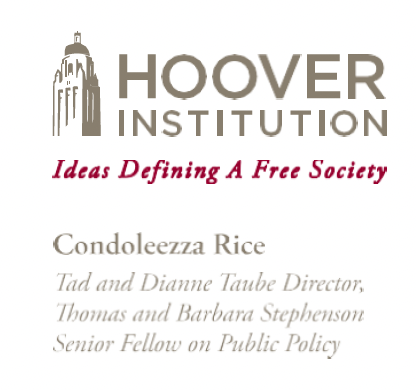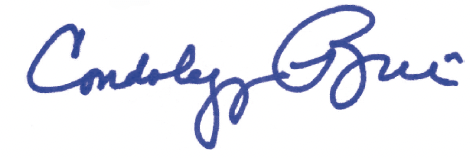Letter From Condoleezza Rice:

Dear Friend,
I am writing this letter to express my gratitude for your generous support of the Hoover Institution and to provide you with an update on the remarkable work being carried out by our scholars. They are tirelessly conducting groundbreaking research, offering solutions to some of the most pressing policy challenges of our time.
On October 7, the world bore witness to a horrifying event as Hamas launched a surprise attack from air, land, and sea on southern Israel. This shocking rampage extended to a music festival and kibbutz communities, where homes were raided and innocent civilians, including the elderly, women, and children, lost their lives. In total, 1,400 people were tragically killed, including Americans. Many more were wounded, and hundreds of individuals are still being held hostage. These horrible attacks have disrupted a period of progress in the region and will have far-reaching military and geopolitical implications, as well as humanitarian impacts, in the months ahead.
Days after the attacks, at the gathering of the Institution’s fall retreat, we held a solemn vigil on the steps of the Hoover Tower to remember the victims of this violence. The retreat included a session with General Jim Mattis and me on how these attacks further impact the global disorder we are witnessing today. Peter Berkowitz provided insightful analysis on the events that led up to the crisis in the Middle East. He shed light on how Hamas, as well as other regional adversaries such as Hezbollah, the Assad regime in Syria, and Iran, closely monitored the internal political divisions and constitutional crisis that had been tearing Israeli society apart.
I strongly recommend reading the recent work of my Hoover colleagues, including Berkowitz, Niall Ferguson, Russell Berman, Victor Davis Hanson, and Amy Zegart, who have provided insightful analyses of the unfolding events in the Middle East and global geopolitics.
The critical question we face is how America and its allies should respond to the multifaceted challenges posed by these events. Some significant answers can be found in Defense Budgeting for a Safer World, a new volume edited by Senior Fellow Michael Boskin. In this volume, leading defense and security experts, including Hoover scholars, offer their perspectives on how policymakers should rethink funding and procedures to build stronger military capabilities. In an era of economic uncertainty, it is vital that our government ensures taxpayer funds are used wisely to deter adversaries and compete in an age of rapid technological advancement.
To maintain our technological edge for both our economy and national defense, America and its democratic partners must harness frontier technologies that are reshaping societies, economies, and global geopolitics. Failing to do so could allow authoritarian forces, such as the People’s Republic of China, to gain significant strategic advantages over the West.
To gain a better understanding of these complex frontier technologies and their policy implications, I am delighted to announce the recent launch of the Stanford Emerging Technology Review. This ambitious university wide initiative, which I co-chair with Jennifer Widom, dean of Stanford’s School of Engineering, along with senior fellows John Taylor and Amy Zegart, brings together Hoover fellows and Stanford scientists and engineers to explore breakthroughs and analyze their policy implications for US government decision makers and leaders in the private sector.
Our ability to effectively address the full range of challenges we face as a country depends on reducing polarization and restoring trust and confidence in our governing institutions, which have seen alarming declines in recent years. As highlighted by my Hoover colleague Josiah Ober in his recently published book The Civic Bargain: How Democracy Survives, history shows that when democracy functions properly, it outperforms authoritarian forms of government. This is achieved when citizens, despite their differences, can engage with each other civilly in political life and offer their talents and skills to maintain a system that guarantees self-rule and individual liberty.
On December 1, our scholars will participate in a daylong conference to mark the public launch of Hoover’s first dedicated center, the Center for Revitalizing American Institutions. At the conference, our scholars will diagnose the political challenges facing our country and provide tangible solutions for rebuilding trust and strengthening our most esteemed institutions, including the military, Congress, and our elections process.
Finally, we are pleased to welcome new senior fellows who represent the core of the Institution’s scholarly activities. These new fellows include some of the nation’s leading economists, Steven Davis, Ross Levine, and Valerie Ramey; and historian and career diplomat Philip Zelikow, who focuses on foreign policy and statecraft.
Since the founding of the Hoover Institution more than a century ago, we have stood for the values of individual freedom, private enterprise, and constitutional government. It is thanks to your continued support that our group of scholars can continue to generate and advance ideas that can lead to a freer, stronger, and more prosperous America, as well as a safer, more stable, and more secure world. Your generosity is deeply appreciated.
Sincerely,

Condoleezza Rice
Would you consider making a tax-deductible monthly gift to help ensure that Hoover is prepared to address these challenges throughout the year?